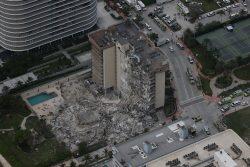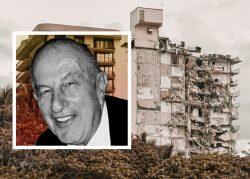The Miami-Dade grand jury empaneled to investigate the deadly Surfside collapse released its 43-page report, outlining recommendations for major changes, including accelerating the timeline for inspections and raising standards for those who perform them.
The partial collapse of Champlain Towers South in June killed 98 people. Though the exact cause of the collapse has not been determined, the building had a number of structural issues and had just begun work tied to its 40-year recertification when a portion of the property pancaked overnight.
The report, released on Wednesday, touched on recertifications – currently only required in Miami-Dade and Broward counties – the lack of maintenance requirements, the need for increased scrutiny of elected and building officials, building neglect, providing notice of structural deficiencies and the additional strain that salt air and water put on properties.
If some or all of the suggestions become law, the impact would be huge. More than 3.5 million residents live in 1.5 million condos in Florida, and more than 60 percent of those units are over 30 years old, according to data from the state’s Department of Business and Professional Regulation.
Here are highlights of the report’s recommendations:
The grand jury is endorsing shortening the inspection timeline and enacting a recertification requirement statewide. Instead of the current requirement of 40-year inspections, the report suggests that buildings should have detailed inspections at no less than 10 years, and no more than 15 years, after completion. Buildings closer to the ocean could have additional requirements to mitigate the effects of saltwater.
“Almost every expert and industry representative who testified to our grand jury opined that they thought 40 years was entirely too long to wait” for an inspection that would determine “the structural, electrical and life safety of buildings and residents in our communities,” the report states.
The grand jury also found that requiring inspections at an earlier date after the completion of a building could lessen the financial toll on unit owners.
Following the collapse, Boca Raton, which is in Palm Beach County, voted to require recertifications for buildings that are 30 years or older. Boca Raton has 242 buildings that meet that criteria now.
The report recommended that owners of buildings 10 years or older be given a deadline for their initial detailed inspections to be completed and filed with local building departments, suggesting that the deadline be no later than the end of 2023.
The grand jury also paid extra attention to painting and waterproofing, suggesting that both be required for exterior building surfaces and roofs, and included in the recertification process. It recommended the checklist for “developer turnover inspection report,” which is used when a developer turns over control of the building to the unit owners, be incorporated into the recertification process.
The grand jury said building departments and officials should play a bigger and more active role in inspecting properties. The report urged building officials to come up with procedures that would ensure owners are conducting maintenance and repairs, as well as inspections. It suggested condo board members be required to file a document that certifies that maintenance, including structural integrity, has been conducted annually.
The grand jury addressed another issue for many municipalities: staffing. It recommends that government officials increase budgets so that building and unsafe structures departments can provide more inspections.
The report recommends that licensed engineers or architects who submit fraudulent or misleading statements in recertification reports face a minimum 1-year suspension. It also recommends that the existing laws and building codes be amended so that only licensed structural engineers can certify buildings for the 40-year recertification and subsequent recertifications.
Read more


The jury also recommends changes on the state level. The Florida Condominium Act fails to mandate that condo boards impose assessments on unit owners in cases where major repairs are needed. The act also provides a waiver to the board’s obligation to fund reserves for repairs.
This waiver should be stricken, and if not, then a waiver has to be approved by at least 70 percent of the owners, the grand jury said. Funds for repairs also can’t be repurposed for other uses.
Also, because cases have arisen where unit owners can’t obtain records from their boards, the jury recommends that it becomes a crime to willfully fail to provide these documents.
The grand jury also endorses the creation of a special unit of investigators who would look at alleged condo fraud. A bill in the Florida Senate would expand the power of the Office of Condominium Ombudsman to audit, investigate and subpoena in connection to condo fraud claims. The grand jury supports such legislation.
The report also recommends a requirement that condo boards and building owners provide their building inspection results to the local building officials within seven days after the reports are completed, or face a “stiff fine.” To support this recommendation, the grand jury cites the case of North Miami Beach’s Crestview Towers condo, which was evacuated in the days following the Surfside collapse when localities embarked on frantic building audits. More than 300 residents were given about 15 minutes to vacate the building.
The city received B&A Engineering Services’ inspection report of Crestview on July 2, even though the report indicated the inspection was done on Jan. 11, according to the grand jury’s findings.
“As was the case with Crestview we are fairly certain that there are other condo boards that are sitting on information and reports that found major structural integrity issues in their buildings,” the report states.
The responsibility to file these reports with localities also has to fall with engineers and architects, who should have a “duty to report,” as well. If they find structural issues with a building, they must alert the local building official within 24 hours, the grand suggests.
Concrete spalling, thought of as playing at least some role in the condition of Champlain Towers South, is common in South Florida oceanfront buildings. So coastal areas should collaborate to come up with guidelines on how to waterproof buildings and inspect for spalling, the grand jury said. These coastal areas also should work under a common action plan to protect existing structures.
The grand jury’s recommendations are not binding, and it did not lay blame for the deadly Surfside tragedy.
The National Institute of Standards and Technology is investigating the collapse, which could lead to criminal charges or to convening a future grand jury.
Separately, a civil suit was filed in November against the development team of the Eighty Seven Park high-end condo immediately south of Champlain.
The complaint alleges that 8701 Collins Development, led by David Martin’s Terra, and its contractors and engineers pushed forward with construction, despite complaints of effects to Champlain and recommendations from their own engineer about safer methods.
Attorneys for Terra’s entity used for that project “categorically” denied this, pointing out reports that Champlain had issues of its own, including with its design, construction and inadequate maintenance. The suit was filed on behalf of some survivors, those who died and their families, and is seeking class action status.
